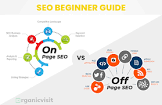The Importance of On-Page and Off-Page SEO
Search Engine Optimization (SEO) is crucial for improving a website’s visibility and ranking on search engine results pages. Two key components of SEO are on-page and off-page optimization.
On-Page SEO
On-page SEO refers to optimizing individual web pages to improve their search engine rankings and attract more relevant traffic. This includes optimizing content, meta tags, headings, images, and URLs. By focusing on on-page elements, website owners can make their pages more user-friendly and search engine-friendly.
- Content: High-quality, relevant content is essential for on-page SEO. Content should be well-written, informative, and optimized for target keywords.
- Title Tags: Title tags help search engines understand the topic of a page. Including target keywords in title tags can improve ranking.
- Meta Descriptions: Meta descriptions provide a summary of a page’s content in search engine results. Compelling meta descriptions can increase click-through rates.
- Heading Tags: Proper use of heading tags (H1 to H6) helps organize content and improve readability for both users and search engines.
- Image Optimization: Optimizing images with descriptive file names and alt text can improve accessibility and boost SEO.
- URL Structure: Creating clean, descriptive URLs that include target keywords can enhance user experience and search engine visibility.
Off-Page SEO
Off-page SEO focuses on improving a website’s authority, relevance, and popularity through external factors such as backlinks, social signals, and online reputation. While on-page factors are within the website owner’s control, off-page factors require external validation from other websites.
- Backlinks: Backlinks from reputable websites signal to search engines that a site is trustworthy and authoritative. Building quality backlinks is crucial for off-page SEO success.
- Social Signals: Social media shares, likes, comments, and followers contribute to a website’s online presence and credibility. Engaging with audiences on social platforms can boost off-page SEO efforts.
- Online Reputation Management: Monitoring online reviews, mentions, and brand sentiment can help maintain a positive online reputation that enhances off-page SEO performance.
In conclusion, both on-page and off-page SEO play vital roles in improving a website’s visibility, credibility, and ranking in search engine results. By implementing effective strategies for both aspects of SEO, website owners can enhance their online presence and attract more organic traffic over time.
Mastering SEO: Key Insights into On-Page and Off-Page Optimization Techniques
- What is the difference between on-page and off-page SEO?
- How can I improve my on-page SEO?
- What are some effective strategies for off-page SEO?
- Why is content important for on-page SEO?
- How do backlinks impact off-page SEO?
What is the difference between on-page and off-page SEO?
The difference between on-page and off-page SEO lies in the focus of optimization efforts. On-page SEO involves optimizing individual web pages by improving content quality, meta tags, headings, images, and URLs to enhance search engine rankings and user experience. In contrast, off-page SEO concentrates on external factors like backlinks, social signals, and online reputation to establish a website’s authority and relevance in the eyes of search engines. While on-page SEO is about optimizing within the website itself, off-page SEO relies on external validation from other websites to boost visibility and credibility. Both components are essential for a comprehensive SEO strategy that drives organic traffic and improves search engine rankings.
How can I improve my on-page SEO?
To improve your on-page SEO, focus on creating high-quality, relevant content that is optimized for target keywords. Ensure that your title tags and meta descriptions accurately reflect the content of your pages and include relevant keywords. Use heading tags to organize your content and make it more readable for both users and search engines. Optimize images with descriptive file names and alt text, and create clean, user-friendly URLs that include target keywords. By paying attention to these on-page elements and providing valuable information to your audience, you can enhance your website’s visibility and ranking in search engine results.
What are some effective strategies for off-page SEO?
When it comes to off-page SEO, there are several effective strategies that can help improve a website’s authority and visibility in search engine results. One key strategy is building quality backlinks from reputable websites, as these external links signal to search engines that a site is trustworthy and authoritative. Engaging with audiences on social media platforms to increase social signals such as shares, likes, and comments can also boost off-page SEO efforts. Additionally, monitoring online reviews and mentions to maintain a positive online reputation plays a crucial role in enhancing off-page SEO performance. By implementing these strategies effectively, website owners can strengthen their off-page SEO efforts and ultimately drive more organic traffic to their site.
Why is content important for on-page SEO?
Content is a fundamental element of on-page SEO because it serves as the foundation for communicating relevant information to both users and search engines. High-quality, informative content that is optimized with target keywords helps search engines understand the context and relevance of a web page. Engaging content not only attracts and retains visitors but also encourages them to interact with the website, ultimately improving user experience and increasing the likelihood of conversions. Additionally, well-crafted content that provides value to readers can earn backlinks from other websites, further enhancing the site’s authority and visibility in search engine results. In essence, content is crucial for on-page SEO as it plays a key role in driving organic traffic, establishing credibility, and boosting overall search engine rankings.
How do backlinks impact off-page SEO?
Backlinks play a crucial role in off-page SEO by serving as external signals of a website’s authority, relevance, and trustworthiness to search engines. When reputable websites link to a site, search engines interpret these backlinks as votes of confidence, indicating that the linked site is valuable and credible. The quality and quantity of backlinks influence a website’s ranking in search engine results pages (SERPs), with high-quality backlinks from authoritative sources carrying more weight. Building a diverse portfolio of quality backlinks through strategic link-building efforts can significantly enhance a website’s off-page SEO performance and contribute to improved visibility and organic traffic over time.






